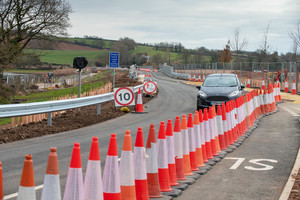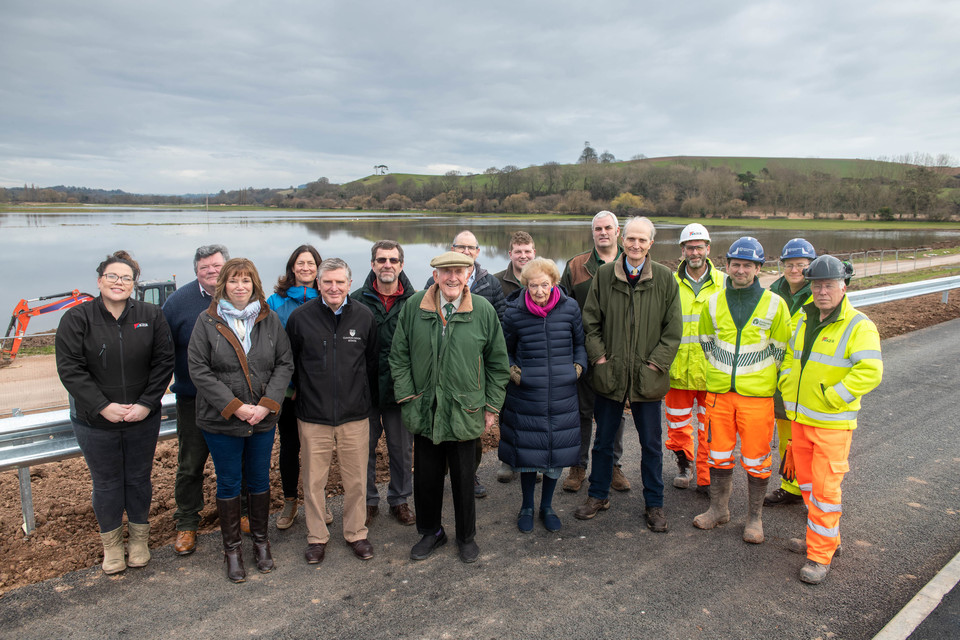Lower Otter Restoration Project gives flood-free access to local community
New South Farm Road and road bridge is open for use.

One of the first drivers across the newly raised South Farm Road in the Lower Otter valley
- The road has been constructed above the existing floodplain
- Access is improved and flood resilient
The newly-raised South Farm Road across the Lower Otter Valley at Budleigh Salterton, Devon, is now open to the public following the completion of an embankment and bridge.
Attended by the Environment Agency, Lord and Lady Clinton, and project staff of Clinton Devon Estates, Pebblebed Heaths Conservation Trust, Kier, and several local residents, the first vehicles made their way across the new road and road bridge (a major project milestone) on 4 March 2023.

Partners, contractors and local residents celebrate the opening of the newly-raised South Farm Road
Passing over the new creek network that was created last autumn to carry water in and out of the restored estuary, the raised structure allows for improved public access by providing an all-year-round, safer, flood-free route.
The raised road embankment and 30-metre span bridge required extensive engineering, with work commencing in 2021 as part of the Lower Otter Restoration Project (LORP). LORP is delivering significant environmental and infrastructure improvements to the area and is due to complete later this year, following work that will see the River Otter and its estuary reconnected to its floodplain for the first time in over 200 years.
Man-made changes to the Otter Valley over this time have resulted in the River Otter being cut off from its natural floodplain. In the face of climate change, this development exposed the valley, its infrastructure, and local community to the increasing effects of extreme weather events and sea level rise. LORP seeks to manage these impacts and help the area adapt for the future. The need and benefit of the raised road was clearly demonstrated last November and December when there was extensive flooding to the valley following heavy rain.
Dan Boswell of the Environment Agency said:
The opening of South Farm Road is a big moment for the project and for the local community. Historically, the area was vulnerable to flooding and tidal events resulting in the former road being closed to the public for significant periods, cutting off important access to homes and businesses.
The raised and improved road means these issues will now be a thing of the past, while also allowing the floodplain to return to a more natural state. This represents a real win for both people and wildlife, which is a core aim of LORP, and it’s great to see it in action.
Local resident, Judith Beckett, said:
As a resident at South Farm, one of the main impacts of the new road will be not having to always keep 2 weeks’ worth of food and fuel supplies in, just in case the road floods and we’re unable to get out for several days at a time. Many times over the years, we’ve had to pull out of social commitments at the last minute, fearing that the road is about to flood - it is wonderful to think that is all behind us.
Nick Pyne, owner of Pynes Farm Shop, added:
No more tractor rides to get to the other side. We can now open without the concern of being cut off and stranded for days.
The Lower Otter Restoration Project is an intertidal habitat restoration project delivered by the Environment Agency in partnership with the East Devon Pebblebed Heaths Conservation Trust and Clinton Devon Estates. It is part of a cross-border initiative called ‘Promoting Adaptation to Changing Coasts’ (PACCo) and is delivering climate change adaptation by working with nature to provide benefits for people and the environment.
Other works include restoring 55 hectares of wetland habitat, the construction of a 70-metre footbridge in the location of the future breach to ensure the continuity of the South West Coast Path, the relocation of Budleigh Salterton Cricket Club away from the floodplain, the capping and protecting of an old landfill from erosion, raising and improving public footpaths, and creating wildlife viewing areas.
To find out more about the Lower Otter Restoration Project, visit: www.lowerotterrestorationproject.co.uk.
For more information on the PACCo initiative, visit: www.pacco-interreg.com.
Background
The LORP project is the English arm of the Anglo-French venture Promoting Adaptation to Changing Coasts (PACCo). It has been majority funded by the UK government, with £8.5 million of co-financing from the European Regional Development Fund (ERDF) through the Interreg V A France (Channel) England programme (2021 to 2023). As part of the initiative, work is also going ahead on a similar project in the Saâne valley in Normandy.